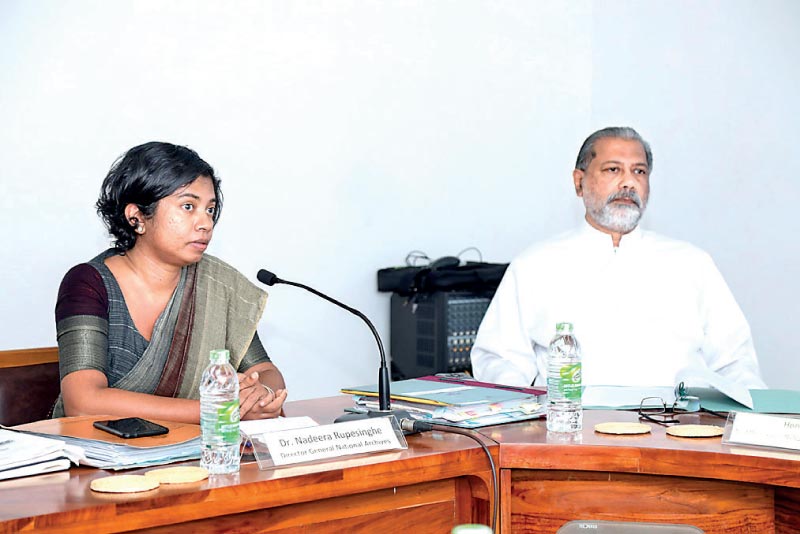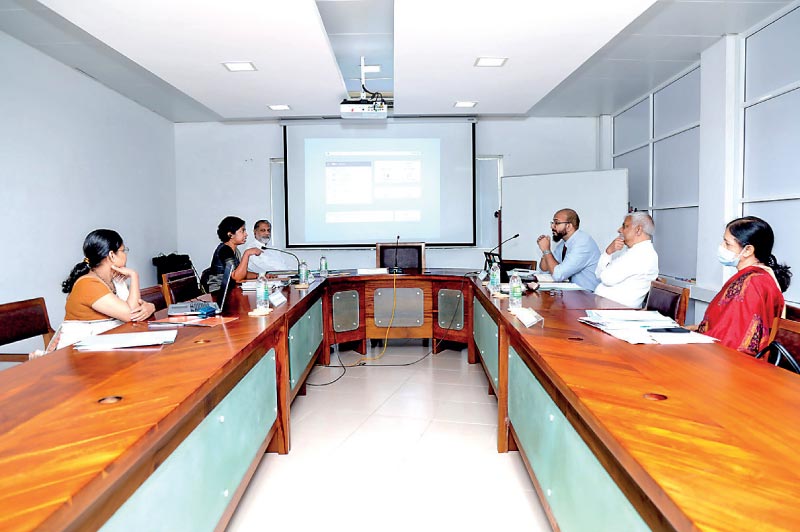Monday Feb 16, 2026
Monday Feb 16, 2026
Monday, 18 March 2024 00:22 - - {{hitsCtrl.values.hits}}
|
Committee to Revise National Archives Law Chairman Nigel Nugawela (Archivist) explaining aspects of the proposed law to the Minister |
The Sri Lanka National Archives (SLNA) has announced that the Framework for National Archives and Records Management Legislation is now available for public comments.
Through this process, SLNA is seeking input on the framework to further improve its various provisions and to develop archives and records management legislation that meets the needs of the public. The framework may be downloaded from https//bit.ly/slna.
All submissions may be sent to [email protected] or posted to or handed over at the Department of National Archives at No. 7 Philip Gunawardene Mawatha, Colombo 07 or to the SLNA’s branch office at No. 4/6, Hemamali Mawatha, Kandy.
Who drafted the Framework?
The framework was drafted by a committee appointed on 15 June 2023 by the Secretary to the Ministry of Buddhasasana, Religious and Cultural Affairs. The committee was led by Archivist Nigel Nugawela, and comprised National Archives Director General Dr. Nadeera Rupesinghe, Information and Communication Technology Agency former Chairman Professor Rohan Samarajiva, Right to Information Commission former Director General Piyatissa Ranasinghe, former Deputy Legal Draftsman Yamuna Ranawana and University College of Ratmalana Lecturer Ravindra Priyantha Lal as members.
The provisions of the framework are informed by the National Policy on Archives and Records Management, which was drafted last year and made available for public comments. The National Policy and the Framework for National Archives and Records Management Legislation will be presented to Cabinet for approval.
Why is the framework required?
The current archives legislation was enacted in 1973. It has been over 40 years since the last amendment to the principal enactment. However, Sri Lanka’s information landscape has drastically changed since the 1970s and 80s.
For example, the volume, forms and media of information; the implementation of systems to manage this information; rapid technological advancements; the prevailing standards and developments in the field of archives and records management; the pressures on archival institutions to be more proactive and representative in how they collect and interact with their publics; the demands for accountability and transparency; and the nexus between archives and records management legislation and right to information and data protection legislation, respectively, are just some, amongst many, of the important considerations that were factored into the decision of the committee to draft a completely new legal framework.
What is in the Framework?
In line with standard provisions that appear in archives and records management legislation in other jurisdictions, global discussions and our own contextual requirements, the areas addressed in this framework include: The selection, transfer and preservation of digital records;
standardisation of records management in public authorities; resolving conflicting legislation that impairs the effective management of archives and records; standards-oriented description to aid the discoverability and retrievability of archives and records; the duty of public authorities to create records; the appointment of records officers in public authorities;
the expansion of the powers, duties and functions of the National Archives to reflect its vital role in preserving memory and in the governance of Sri Lanka’s information infrastructure.
For whom is the framework?
The framework affects the everyday lives of Sri Lankans. Archives and records impact all of us. The ways in which archives and records are managed and their accessibility and usability play a part in determining our ability to exercise rights, to understand the past and to hold decision-makers to account. As affirmed in the Universal Declaration on Archives, to which the Sri Lanka National Archives became a signatory in June 2023, there is a “collective responsibility of all—citizens, public administrators and decision-makers, owners or holders of public or private archives, and archivists and other information specialists—in the management of archives”.
Why is this process important?
On the recommendation of the committee, the Ministry of Buddhasasana, Religious and Cultural Affairs approved the release of the framework for public comments. This was done in recognition that public input through a consultative process would improve the quality of the framework, and ensure that it is fit-for-purpose, consistent with the Constitution and that it reflects the needs of society.

Minister of Buddhasasana, Religious and Cultural Affairs Vidura Wickramanayake and Committee member Dr Nadeera Rupesinghe (Director General National Archives)

Committee to Revise National Archives Law No. 48 of 1973 presenting framework for new law to Minister of Buddhasasana, Religious and Cultural Affairs on 08.02.2024